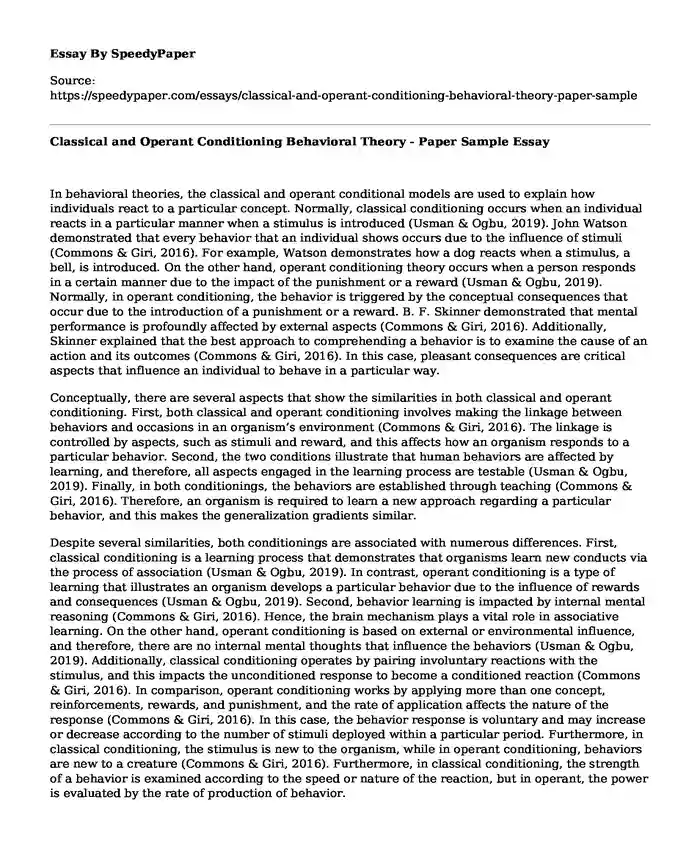In behavioral theories, the classical and operant conditional models are used to explain how individuals react to a particular concept. Normally, classical conditioning occurs when an individual reacts in a particular manner when a stimulus is introduced (Usman & Ogbu, 2019). John Watson demonstrated that every behavior that an individual shows occurs due to the influence of stimuli (Commons & Giri, 2016). For example, Watson demonstrates how a dog reacts when a stimulus, a bell, is introduced. On the other hand, operant conditioning theory occurs when a person responds in a certain manner due to the impact of the punishment or a reward (Usman & Ogbu, 2019). Normally, in operant conditioning, the behavior is triggered by the conceptual consequences that occur due to the introduction of a punishment or a reward. B. F. Skinner demonstrated that mental performance is profoundly affected by external aspects (Commons & Giri, 2016). Additionally, Skinner explained that the best approach to comprehending a behavior is to examine the cause of an action and its outcomes (Commons & Giri, 2016). In this case, pleasant consequences are critical aspects that influence an individual to behave in a particular way.
Conceptually, there are several aspects that show the similarities in both classical and operant conditioning. First, both classical and operant conditioning involves making the linkage between behaviors and occasions in an organism’s environment (Commons & Giri, 2016). The linkage is controlled by aspects, such as stimuli and reward, and this affects how an organism responds to a particular behavior. Second, the two conditions illustrate that human behaviors are affected by learning, and therefore, all aspects engaged in the learning process are testable (Usman & Ogbu, 2019). Finally, in both conditionings, the behaviors are established through teaching (Commons & Giri, 2016). Therefore, an organism is required to learn a new approach regarding a particular behavior, and this makes the generalization gradients similar.
Despite several similarities, both conditionings are associated with numerous differences. First, classical conditioning is a learning process that demonstrates that organisms learn new conducts via the process of association (Usman & Ogbu, 2019). In contrast, operant conditioning is a type of learning that illustrates an organism develops a particular behavior due to the influence of rewards and consequences (Usman & Ogbu, 2019). Second, behavior learning is impacted by internal mental reasoning (Commons & Giri, 2016). Hence, the brain mechanism plays a vital role in associative learning. On the other hand, operant conditioning is based on external or environmental influence, and therefore, there are no internal mental thoughts that influence the behaviors (Usman & Ogbu, 2019). Additionally, classical conditioning operates by pairing involuntary reactions with the stimulus, and this impacts the unconditioned response to become a conditioned reaction (Commons & Giri, 2016). In comparison, operant conditioning works by applying more than one concept, reinforcements, rewards, and punishment, and the rate of application affects the nature of the response (Commons & Giri, 2016). In this case, the behavior response is voluntary and may increase or decrease according to the number of stimuli deployed within a particular period. Furthermore, in classical conditioning, the stimulus is new to the organism, while in operant conditioning, behaviors are new to a creature (Commons & Giri, 2016). Furthermore, in classical conditioning, the strength of a behavior is examined according to the speed or nature of the reaction, but in operant, the power is evaluated by the rate of production of behavior.
References
Commons, M. L., & Giri, S. (2016). Account of operant conditioning based on coordinating three procedural steps of respondent conditioning processes. Behavioral Development Bulletin, 21(1), 14. https://psycnet.apa.org/journals/bdb/21/1/14.pdf
Usman, U. A., & Ogbu, J. E. (2019). Application of classical and operant conditioning theories of learning in cooperative member education and staff training. Global Journal Of Applied, Management And Social Sciences, 16. www.gojamss.net/journal/index.php/gojamss/article/download/413/411
Cite this page
Classical and Operant Conditioning Behavioral Theory - Paper Sample. (2024, Jan 02). Retrieved from https://speedypaper.net/essays/classical-and-operant-conditioning-behavioral-theory-paper-sample
Request Removal
If you are the original author of this essay and no longer wish to have it published on the SpeedyPaper website, please click below to request its removal:
- Free Essay on Professional Development for Teachers
- Free Paper on Understanding a Diagnostic Approach to Assessing and Teaching Reading
- Free Essay Example. When the Coach Is You: Reflection
- Free Essay. My Consumer Choice
- Essay Example - Education Foundation
- Free Paper Sample on Navigating Organizational Change
- Reapplication for DPT School - Free Paper Sample
Popular categories





